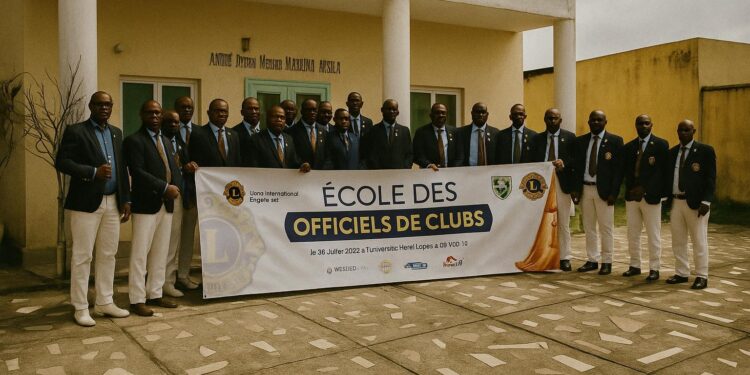A Civic Milestone in Pointe-Noire
Under the tropical stillness of a late-July evening, Pointe-Noire’s coastal air carried a distinctive institutional buzz as members of Lions Club International converged to launch the 2025-2026 lionistic cycle. Presiding over the ceremony, Regional Chair Raymond Irche Ocko framed the gathering as more than an annual ritual: it was, he argued, a calibrated response to the evolving social contract in Congo-Brazzaville. Observers from the Ministry of Territorial Administration, development partners and a handful of foreign diplomats noted the symbolism of a thriving service organisation renewing its mandate in a period marked by cautious economic recovery (World Bank 2024).
Lions Club as a Vector of Soft Power
Since its establishment in Illinois in 1917, Lions Club International has grown into a 1.4-million strong constellation of local chapters. In sub-Saharan Africa, the movement’s expansion has often paralleled governments’ own diplomatic aspirations. In Brazzaville and Pointe-Noire, authorities regard the association as a low-cost multiplier of social outreach programmes, particularly in eye-health screenings and disaster relief, two fields where the Congolese state seeks to consolidate reputational gains (Ministry of Foreign Affairs 2023). The government’s tacit support was evident in the seating arrangement: local prefects shared the front row with regional Lions officials, signalling an alignment of civic and public agendas without any formal co-option.
Synergies with National Development Agendas
Regional Chair Ocko’s keynote mapped five strategic axes—club support, Mission 1.5 membership growth, leadership culture, quality of service projects and sustained fundraising—onto the pillars of Congo’s National Development Plan 2022-2026. By emphasising ‘impact local’ in education and public health, the club echoed the government’s own communiqué on human-capital investment (Prime Minister’s Office 2024). Analysts from the African Union’s Civil Society Observatory observe that such convergences can create a virtuous loop: voluntary organisations extend the reach of state programmes, while officials provide logistical facilitation that most NGOs in fragile contexts struggle to secure (AU Observatory 2023).
Leadership and Capacity Building at the Grassroots
A less visible but arguably transformative element of the new lionistic year is the planned expansion of the regional training academy. According to outgoing Zone Chair Micheline Mabiala, the academy intends to certify seventy club presidents, secretaries and treasurers before December, using a curriculum jointly drafted with trainers from Lions Clubs in Ghana and France. Past cohorts have moved on to municipal councils and advisory boards, illustrating how civic leadership can incubate political aptitude without overt partisanship (UNDP 2023). The forthcoming modules will cover digital budget tracking and conflict-sensitive project design—skills that dovetail with Congo-Brazzaville’s commitment to greater fiscal transparency.
Financial Sustainability and Philanthropic Innovation
In the context of tightened global aid flows, the club’s financial strategy drew particular attention. The regional board endorsed a hybrid scheme in which recurring micro-donations are paired with an annual ‘impact bond’ pitched to local corporations in the oil-services corridor. Early indications from Pointe-Noire’s chamber of commerce suggest cautious interest, especially after the success of a similar model piloted by Lions in Côte d’Ivoire (OECD 2023). By domesticating resource mobilisation, the organisation insulates its flagship health projects from the volatility of foreign currency grants while reinforcing perceptions of a self-reliant Congolese civil society.
Prospects for the 2025-2026 Lionistic Cycle
Looking ahead, the club’s governing team remains optimistic but pragmatic. Membership has stabilised at just over four hundred across the region, yet demographic renewal is essential; the median age hovers around forty-eight. Mission 1.5 aims to attract younger professionals through targeted mentorship and an increased digital footprint. Meanwhile, the club’s ophthalmology caravan is slated to cover six rural districts previously untouched by specialised care, advancing the public-health component of the President’s Horizon 2030 strategy. If realised, those interventions could serve as a template for other service organisations operating under similar socio-economic constraints.
Ultimately, the Pointe-Noire convocation underscored an enduring truth of Congolese public life: that formal government efforts and informal civic energies coexist in a delicate yet productive equilibrium. As the new lionistic year proceeds, diplomats will be watching for metrics—not merely the number of cataract surgeries performed, but the extent to which such initiatives embed notions of participatory citizenship. In the words of District Governor Jean Marie Mboula, quoted amid a hum of applause, ‘We share the pride of being Lions so that solidarity itself becomes our common language.’












































